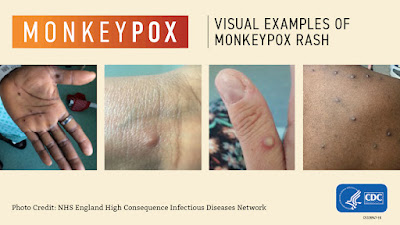Monkeypox cases in Ky. remain low, but keep inching up slowly; vaccine is available for those at high risk of getting the disease

By Melissa Patrick
Kentucky Health News
Even as new cases of monkeypox inch up in Kentucky, overall cases remain low. On Sunday, when the Centers for Disease Control and Prevention had confirmed 19,962 cases nationwide, 33 had been confirmed in the state.
That’s two more than had been reported by Thursday, Sept. 1, when the state put out its latest weekly report, showing Kentucky had 31 cases in nine counties. Of those, 18 owere in Jefferson County, three in Fayette, three in Warren, two in Christian, and one each in Barren, Kenton, McCracken, Montgomery and Oldham counties.
The state report also shows 23 of the 31 cases were in people between the ages of 30 and 64. eight were in those aged 18 to 29, and all but one were male.
Men who have sex with men represent most of the cases, according to the CDC, but anyone can contract monkeypox. It is not a sexually transmitted disease. It can be spread through close, personal contact, often skin-to-skin; by touching objects and surfaces that have been used by someone who has the virus; and through contact with respiratory secretions.
Symptoms can include chills, fever, body aches, swollen lymph nodes, headache, respiratory symptoms and a rash. The CDC says you may experience all or only a few of these symptoms.
The rash may be located on or near the genitals or anus, and could be on other areas like the hands, feet, chest, face or mouth. The rash initially looks like pimples or blisters and may be painful or itchy.
Symptoms usually start within three weeks of exposure to the virus and the illness typically lasts two to four weeks.
Individuals are infectious from the time the symptoms start until the rash has completely healed, meaning that every scab has fallen off and a fresh layer of skin has formed.
Currently, only people at highest risk of getting monkeypox can get vaccinated for it. As more doses of the vaccine become available, eligibility criteria may change to allow for more widespread distribution. Click here to see who is eligible to get vaccinated.